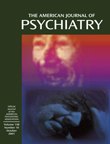To the Editor: To our knowledge, only two studies have systematically examined the treatment of postpartum depression with standard antidepressants. One found that fluoxetine or cognitive behavior therapy was effective for treatment of major or minor depression appearing in the first 8 postpartum weeks
(1). In another open study, sertraline was found to be effective for treatment of major depression occurring within 6 months of delivery
(2).
We report on an 8-week, open-label trial of six subjects, approved by the University of California at Los Angeles institutional review board. Primary inclusion criteria consisted of outpatient status, female sex, age between 18 and 45 years, onset of major depression in the first 8 postnatal weeks, and scores of 17 or higher on the 21-item Hamilton Depression Rating Scale and 12 on the Edinburgh Postnatal Depression Scale
(3). Subjects with an onset of depression during pregnancy, the presence of psychosis, active suicidal ideation, hypothyroidism, or a history of alcohol or substance abuse within the 12 months before screening were excluded from the study. We obtained written informed consent from all subjects after the study had been explained to them. Subjects began fluvoxamine treatment, 50 mg/day, and were followed with weekly clinical interviews and administration of the Hamilton depression rating scale by a blind rater. Over the first 2 weeks of the study, fluvoxamine doses were titrated to 150 mg/day to achieve clinical response with minimal or no side effects. The primary outcome variable was remission, operationalized as a Hamilton depression scale score of 7 or less.
Statistical analysis of response was performed for all six subjects. Data analysis included the last observation carried forward for a nonresponder who discontinued treatment at week 5. Four subjects (67%) became euthymic, with a mean time to response of 6 weeks (SD=1). Final Hamilton depression scale scores ranged from 2 to 5 for the four responders and 16 to 18 for the two nonresponders. Baseline demographic characteristics and severity of depression did not differ between responders and nonresponders. Past history of depression or prior response to treatment were not predictive of treatment response. The mean final daily dose of fluvoxamine for all subjects was 142 mg/day (SD=20) (150 mg/day for the three responders and both nonresponders and 100 mg/day for one responder). Repeated measures analysis of variance indicated a significant linear decline in Hamilton depression scale scores over time (F=12.00, df=1, 5, p=0.02). Paired t tests demonstrated that the greatest degree of improvement occurred between weeks 2 and 3 (t=5.48, df=5, p=0.003).
Our findings, although limited by our small group size, the single-blind study design, and the lack of a placebo control group, suggest that fluvoxamine is effective in the treatment of postpartum depression. Given the prevalence and complications of postpartum depression, future large-scale studies are warranted.

